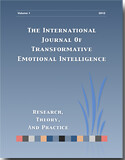The InterÂnaÂtional JourÂnal of TransÂforÂmaÂtive EmoÂtional Intelligence
TIJTRI ISSN 2165–0098

Â
Â
Â
Â
Â
ConÂtents
Â
EdiÂtors’ Notes (p. vii)
LetÂter from Dr. Arthur Linskey (p. viii)
ForeÂword (p. xi)
1. LibÂerÂatÂing and ActuÂalÂizÂing Human PotenÂtial (pp. 15–20)
In this 2010Â Keynote at the 3rd Global Forum for EI and LeadÂerÂship, the author answers comÂmon quesÂtions and about the education-transformative model of emoÂtional intelligence.
Â
2. The TransÂforÂmaÂtional Model of EmoÂtional IntelÂliÂgence: ImprovÂing StuÂdent Access and SucÂcess (pp. 21–38)
The EmoÂtional Skills AssessÂment Process (ESAP) is used in many curÂricuÂlum iniÂtiaÂtives in higher eduÂcaÂtion. In this artiÂcle, a disÂcusÂsion is proÂvided of research derived hallÂmarks and model proÂgrams from sevÂeral key iniÂtiaÂtives throughÂout higher education.
Â
3. EmoÂtional IntelÂliÂgence, Teacher EduÂcaÂtion, and Future StudÂies (pp. 39–50)
A report of past, present, and future teacher prepaÂraÂtion research using the eduÂcaÂtion model of emoÂtional intelligence.
Â
4. EmoÂtional IntelÂliÂgence and ForÂeign LanÂguage ProÂfiÂciency: RelatÂing and ComÂparÂing ESAP and TOEFL PerÂforÂmance (pp. 51–60)
A relaÂtional and comÂparÂaÂtive study evalÂuÂatÂing emoÂtional intelÂliÂgence perÂforÂmance as meaÂsured by the ESAP and masÂtery of EngÂlish as a secÂond lanÂguage as meaÂsured by the PBTÂ TOEFL.
Â
5. The StanÂdardÂizaÂtion of the EmoÂtional Skills AssessÂment Process (ESAP) for South African StuÂdents of Higher EduÂcaÂtion (pp. 61–72))
The chalÂlenges, soluÂtions, and sucÂcess of the impleÂmenÂtaÂtion and stanÂdardÂizaÂtion of the ESAP in Tshwane UniÂverÂsity of TechÂnolÂogy, PreÂtoÂria, South Africa.
Â
6. ProÂfesÂsional MilÂiÂtary EduÂcaÂtion (PME) in the USAF SOS LeadÂerÂship Course: IncorÂpoÂratÂing EmoÂtional IntelÂliÂgence (pp. 73–96)
A study was conÂducted at Air University’s Squadron OffiÂcer ColÂlege (SOC) to evalÂuÂate relaÂtionÂships between two conÂstructs; leadÂerÂship and EI. The artiÂcle presents quanÂtiÂtaÂtive eviÂdence supÂportÂing sigÂnifÂiÂcant relaÂtionÂships between sevÂeral EI skills meaÂsured by the EmoÂtional Skills AssessÂment Process (ESAP) and stuÂdent perÂforÂmance in the leadÂerÂship curÂricuÂlum in Air University’s, Squadron Officer’s School (SOS).
Â
7. The Power of EmoÂtional IntelÂliÂgence in TransÂformÂing Lives: Voices from Higher EduÂcaÂtion (pp. 87–108)
QualÂiÂtaÂtive reflecÂtions are shared from the impleÂmenÂtaÂtion of an EI proÂgram at a small priÂvate colÂlege in San AntoÂnio, Texas. The expeÂriÂence is told from the perÂspecÂtive of the faculty-administrator who chamÂpiÂoned the iniÂtiaÂtive, as well as from many of the stuÂdents who benÂeÂfitÂted directly.
Â
8. EmoÂtional IntelÂliÂgence from the PerÂspecÂtive of Cognitive-Experiential Self-Theory (CEST) (pp. 109–121)
What is the difÂferÂence between havÂing knowlÂedge about emoÂtions and modÂelÂing emoÂtional intelÂliÂgence? A disÂcusÂsion of limÂiÂtaÂtions of two influÂenÂtial approaches and theÂoÂries is proÂvided. An alterÂnaÂtive based on CEST is introduced.
Price: $35.00
To order copies of the jourÂnal, please conÂtact EI LearnÂing SysÂtems at 1–888-680‑7983 or
EI LearnÂing Systems
P.O. Box 271877
CorÂpus Christi, TXÂ 78427
If you are interÂested in pubÂlishÂing in TIJTEI, please learn about the types of artiÂcles accepted by the jourÂnal, the peer-review process, forÂmatÂting guideÂlines, and more by visÂitÂing the EITRI AssoÂciÂaÂtion WebÂsite.
Leave a Reply
You must be logged in to post a comment.